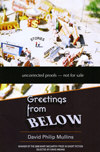Greetings from Below
These linked stories of Nick Danze’s sexual experiences, though self-contained, are arranged chronologically from the age of fourteen through his adult years, and therefore read like a novel.
Most of the stories are set in Las Vegas, starting with the first: during a drought, fourteen-year-old Nick and his friend Kilburg steal saplings from street plantings to surround their makeshift fort in the desert. Diabetic Kilburg with his fake leg introduces Nick to alcohol and sexual yearning, and with the failure of that friendship, a pattern of Nick’s failed relationships begins. In this first story, his father is dying, and we don’t learn until the end story why he can’t let go of his memory, even writing notes to his dead father, “greetings from below,” for his advice. His incapacity to commit begins in his twenties when as a virgin, he runs away from an “Asian Sensation” prostitute, because she insists that he say he loves her. Between caring for his mother who drifts into several different addictions and his inability to break with Annie, a decent attractive girl, whom he doesn’t love, Nick starts and stops affairs mostly obsessed with overweight, older women. He scorns Las Vegas for its “broken promises, its hyped immoderation,” but his appeal of gentlemanly innocence makes him vulnerable to trickery.
He is dominated by guilt, shame and lies, as particularly witnessed in the three stories from the first person “I” perspectives, instead of the rest where Nick is distanced in third person “he” perspective. In “True Love vs. the Cigar-Store Indian” he lives across the street from a “big wooden Indian with “arms folded high on his chest and hawk eyes half closed and black.” This “giant Apache” even when it’s been carted inside the store, watches Nick:
Even at night watched me. He was just as contemptible as I was, and he reminded me of everything I detested about myself. I would look deep into him and contemplate my licentious urges and my behavior toward Annie, at times begging him out loud to stop watching me, psychotically hoping my words would have some effect. I would tell him that I wasn’t going to be like him anymore, that I was going to change for the good and he would be alone in his ignobility.
In “First Sight” Nick, the I again, is watching his frustrated wife’s affair unfold:
A smile across your face. I can see how much he means to you, Annie, and I’m moved only by an erotic excitement the likes of which I’ve never known before. At the same time, I feel myself consumed with guilt. When I think of your unrequited feelings for me, of how lonely you seem when we’re together, of what it might be like to be you, Annie—to yearn for your own spouse’s attention, to know the boundaries of your own appeal—I hate myself for ever agreeing to marry you.
In the last story, “Crash Site on a Desert Mountain,” we learn why his father haunts him. Nick says something awful to his father on their last hiking trip together, and like all his other relationships he cannot act: “I knew I had to apologize but I couldn’t speak. I couldn’t even cry. I just stood there, ashamed of what I had done, wondering who I was and who I might become.” Since this is not the most recent story, we learn that he can move off stasis. Thus the stories might be sad but not grim and are beautifully written.





